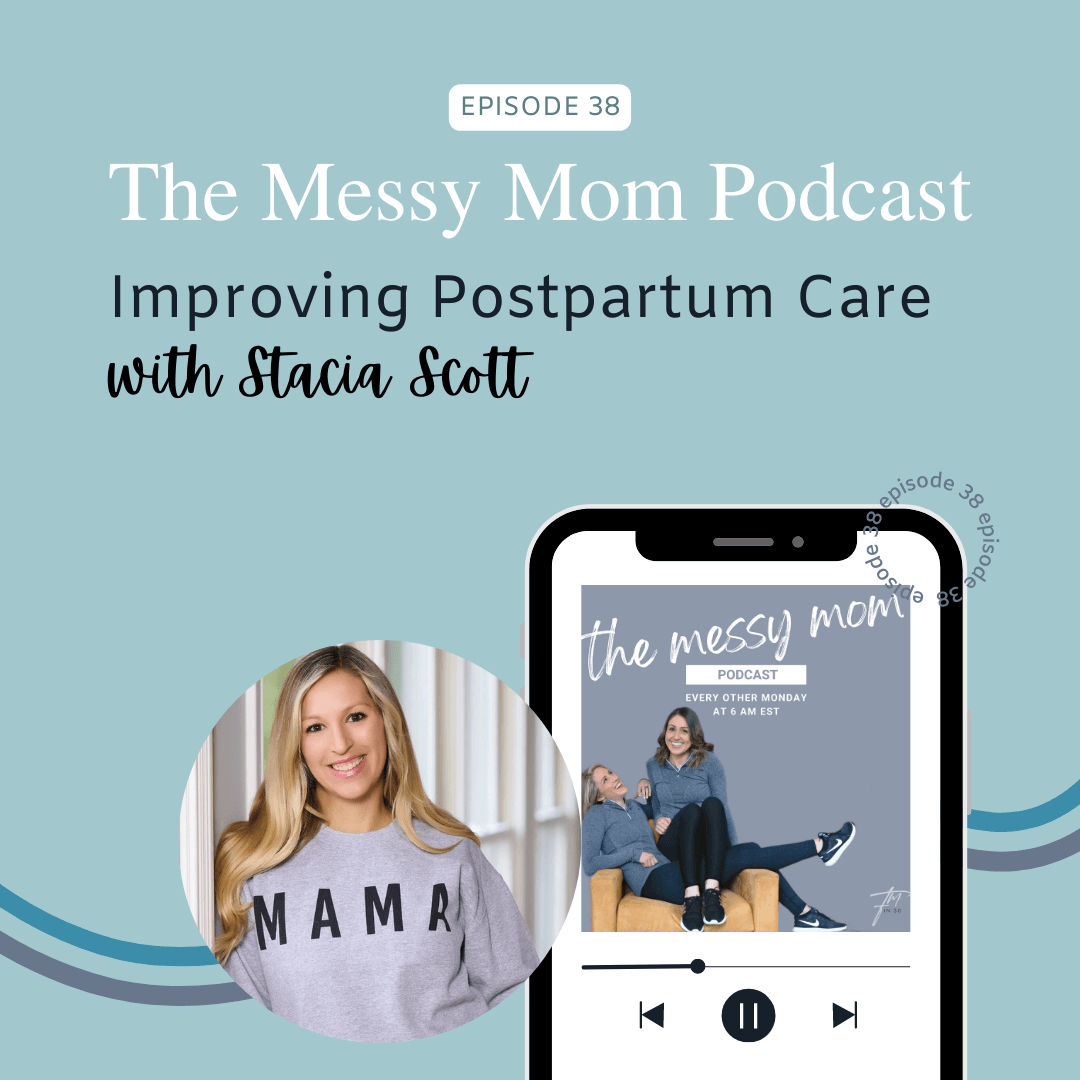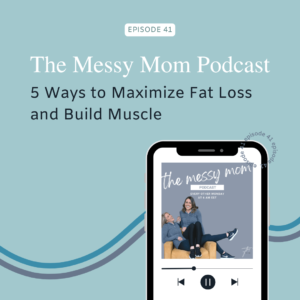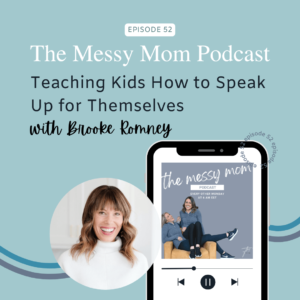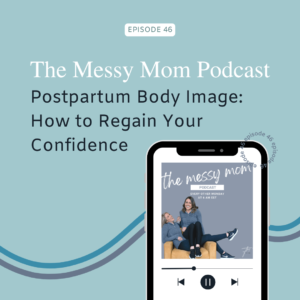CLICK PLAY TO LISTEN TO IMPROVING POSTPARTUM CARE WITH STACIA SCOTT:
Improving Postpartum Care
After connecting through Instagram we knew we needed to have Stacia Scott on the Messy Mom podcast to discuss postpartum care because prenatal and postpartum care, especially in our country, is nowhere close to where it needs to be. A little more about her, she’s a nurse practitioner who focuses on women’s health. Her background is women’s health oncology, labor and delivery, and internal medicine. And definitely where her passion lies. But more importantly, she is a wife and mom. She is married to her high school sweetheart, Eric and they have 3 under 3, all boys, Shepherd, Easton, and Cody!
After having a couple of frightening personal experiences that led to her starting her own (all virtual!) postpartum care clinic, Postpartum Care of Indiana.
In this episode, we and Stacia talk about why she got started in postpartum care, learning more about postpartum, why it can be overlooked, startling statistics, how it can improve, and more.
Why Stacia got Started
Jumping right in, Cari asked Stacia why she started Postpartum Care of Indiana specifically and to explain more about what she does.
She starts with her own personal story of when pregnant with her first child. They, unfortunately, had experienced fertility issues and she had bad endometriosis. But with IUI, they were blessed to have a baby that route.
And through the experience of her first pregnancy, she realized, everything is about the labor aspect. It’s monitored closely, you get your labs drawn, and you figure out your preferences with labor. Yet, there is nothing for postpartum and that can go so many ways and in a thousand different directions.
So, after her own delivery, she felt like she had this in the bag. But the minute she left the hospital she felt crazy. She had no idea what she was doing. Where was her nurse or her support? She had all these other questions like…
- Why is my doctor no longer here? Why can’t I see him?
- How often do I feed?
- Why do my breasts hurt?
- Why am I bleeding?
- Is this normal? Is this abnormal?
- Why do I have these awful night sweats?
- How come I’m still having contractions when I’m feeding?
And like her, you may have also experienced similar questions postpartum or wondered what was going on with your body. So, for her own benefit, that is when she started to really dive into postpartum care and make herself an expert in the field.
At around 6 months postpartum, Stacia was diagnosed with postpartum OCD, postpartum rage, and postpartum anxiety. Even though she is in the medical field, she still had no idea about what these were, what symptoms to look out for, or where to begin to get support.
The most she received was some medicine to help get her on her way. But she soon found it was just putting a bandaid over her issues. So, she began researching and starting her own routines to improve.
Then fast forward to January of 2021, and one of her best friends was having her first baby. It was a beautiful pregnancy and great delivery. Everything was fantastic and she was sent home. After about 12 hours after she was home postpartum, she and Stacia were chatting on the phone. And her friend mentioned, that her legs were really swollen and sent Stacia a photo. After seeing the photo, she told her, “you’re not going to want to hear this but you’re going to call your doctor and you are going to the ER.” At first, her friend was hesitant but she did thank goodness!
She was admitted and put on magnesium because her blood pressure was super high. Fast forward again to the following day, Stacia gets a call that her young and healthy friend had coded and is being lifeline down to Riley OBI CU in Indianapolis. And she couldn’t believe it.
Luckily, she ended up surviving and they learned she had ended up having postpartum cardiac myopathy induced by high blood pressure that went poorly managed. This was something that was 100% preventable.
And at no fault of anybody, this is just where we’re at with postpartum care. After her friend recovered, they were FaceTiming for the first time and Stacia knew this cannot happen to families. It should never have happened and who knows how often this happens.
She knew this needs to change. Moms deserve better and she was opening up a clinic. And that’s when Postpartum Care of Indiana came to fruition.
Postpartum in General
Bailey felt the exact same way when it came to postpartum in general. She felt like she didn’t know what to be concerned about or what was okay and not okay.
Bailey did end up having COVID right after giving birth (if you’ve missed the episode on Bailey’s Birth Story listen here). But especially for first-time moms, who have never done this before, there are a lot of questions. You don’t know what to expect, even with how prepared you could be.
And Stacia agreed. She mentions that when they do give you postpartum information that may not be the best time to do it. You are packing up, ready to go, and excited to go home. And in the midst of packing, the hospital will have you sit down and go through 5 minutes of things you may need to know. Then they hand you a packet and say if you have any other questions it’s all in this packet. But when you get home, where does that packet go? It’s either lost, thrown in the trash, or put in a drawer, and you don’t look at it because you’re so overwhelmed.
They do try. It’s just not the right time. Before you leave, after you have a baby, you’ve been up all night, you’re bleeding, you’re in pain, you’re figuring out your own stuff. Right before you leave to go home is probably not the best time that you’re going to get someone’s attention.
Postpartum Care of Indiana
And that is where Postpartum Care of Indiana comes in. They are all Telehealth and focus on 5 areas. These pillars were common themes she was seeing when doing research and learning how to treat postpartum moms because none of their journeys are the same.
- Preparation
- Sleep and Rest
- Nutrition and Supplements
- Companionship
- Ongoing Coaching
Stacia sees patients who are currently pregnant to all the way two years postpartum. She mentions that preparation for postpartum never ends because you have to think of postpartum as similar to your pregnancies.
And she says, “You have these trimesters of hormone waves that you’re gonna experience. So at 4 and 6 months postpartum, you will feel another dip in your hormones. Between 8 and 10 months postpartum, you will feel another dip in your hormones. So things that happen that I can prepare moms for and say ‘hey listen when you start your period these things may happen. When you do XYZ these things may happen. So that’s what preparation can look like.”
Her clinic also does postpartum anxiety and depression screenings every other visit because studies show that can happen at any point in time after that 2-week baby blue period. And it looks different for everyone. This is a screening Stacia and her nurse practitioner, Sarah, put together that is tailored specifically for moms. Not just your typical “are you feeling tired” questionnaire.
They also have a bereavement program as those moms are also left high and dry. Not only do they have to go through postpartum but they don’t have a baby to show for the symptoms they’re experiencing. Which can be extremely traumatic, especially with very minimal support.
Why is Postpartum Care Overlooked
The next question we asked Stacia is why does she feel postpartum care is overlooked? Especially since it’s such a huge thing that happens in a lot of women’s and families lives.
Stacia thinks it’s an accumulation of different things.
For one, she feels it’s where our complacency has been. Postpartum is very difficult to manage. It takes a lot of time and effort. And she just doesn’t think OBGYNs have the time. They are bombarded with women of all ages (adolescent to adult). She says, “in a perfect world, I wish that we could split it and have OBs and GYNs. That way OBs just took care of moms, babies, and postpartum, and GYNs took care of every other need.”
Another thing is, she thinks we don’t look at postpartum as a need here in the US. A lot of insurance companies don’t cover postpartum. Which we all thought was crazy. And Bailey adds that “if someone injures themselves in a sport, insurance typically covers whatever surgery they have to have. So why is it any different with postpartum care when you’re literally having either surgery, there could be a complication or just the act of itself is a lot on the body.”
And Stacia clarified that if you have a healthy delivery, it’s not covered. But if you have a c-section you are able to get more visits postpartum because of the surgery aspect. But a lot of postpartum issues that Stacia sees aren’t so much physical as they are mental.
She feels there is just a lack of support still. Luckily there is an organization, Postpartum Support International (PSI) that has helped bring perinatal mood disorders to light but she still thinks there is room to grow.
Another area Stacia was amazed didn’t get done postpartum is getting labs drawn with all the hormone fluctuations that happen.
Again, she doesn’t think it’s the fault of anyone. She just doesn’t think anyone has said, enough’s enough or asked these questions –
- Why are mortality rates so high?
- Why are 80% to 90% of these preventable?
- Why is this still happening?
And she wants to help change that!
Postpartum Care in Other States + Startling Statistics
Cari was shocked by the stats that Bailey and Stacia shared with her before getting started.
“Indiana is the third highest postpartum mortality rate.”
And Stacia continued with some more facts,
“83% of all maternal deaths happen postpartum.” So, this is anywhere from once they leave the hospital.
“And of that 83%, 80% and they’re thinking it’s even higher than that for this. I haven’t seen this last year’s data yet, but 80% of those are 100% preventable.”
Which is just insane. And made Stacia wonder, “what is happening?” She points out, “You also have to think on the flip side, hospitals are a business. And I’m not saying that they give bad care. It’s just, one patient in, one patient out. Postpartum is very quick, in and out.” But she reminds us that moms can advocate for themselves.
“If you notice your blood pressure is really high. You can say, ‘I’m not really comfortable with going home. I would like to stay another night.’ And you will stay another night. Insurance will cover it.”
And in her friend’s case, they did say to her to look for these signs and symptoms. But Stacia reminds us that “all of those signs and symptoms of that mimic her being tired from being a first-time mom, being worn out from her labor.” So, she couldn’t distinguish what was normal or abnormal. On top of that, her friend felt bad for calling and didn’t want to “be that person.”
Stacia continues, “how many times as moms, do we not want to ask for help or cry wolf? But you should, that is why we have care providers.”
What Needs to Happen to Improve Overall Postpartum Care
The next question Bailey asked Stacia was when it comes to improving overall postpartum care in general, what do you think needs to happen? Is it more people like her who start up these types of postpartum care clinics? What needs to happen for this to improve over the entire United States?
First, she thinks there needs to be care tailored just to postpartum moms. “All the care goes to the baby, which rightfully so. Everyone wants to care for that child and they are well cared for. But then what ends up happening is that we’re so focused on that child. We end up suffering because we put our needs on the back burner.” She remembers her own experience with this and how her husband would come to her at 4 in the afternoon to ask…
- Have you eaten today?
- Have you like have you showered today?
- Have you done anything today?
And she’d realized she hadn’t, she hadn’t even drunk water or eaten. And that can be when breastfeeding issues come in. It can be difficult to provide what you need to for your child if you’re not taking care of yourself.
So, Stacia thinks that it starts with care. And her ultimate goal is to spread Postpartum Care of Indiana across the US and have a nurse practitioner in every state, Telehealth, that can see patients. Then her second goal is to get legislation passed that postpartum care should be covered, for up to a year. Pregnancies are covered so why is postpartum care not?
Mental Health
Changes need to happen still, including in mental health. Stacia mentioned what had happened in Massachusetts with a mom. “They are saying that it was because of postpartum anxiety that turned into postpartum psychosis.” These things are real and it really does scare you.
“It is so sad that it happened and it could have been prevented had she gotten the help she needed”, Stacia continues.
Cari points out that her sister is a psychiatric nurse practitioner for adolescents. And everyone in that field is so overwhelmed. They want to do their part, but the resources and funding aren’t there. It’s again, put on the back burner.
Bailey also was thinking about why this was being overlooked. And OBGYNs are also so busy. She was potentially going to have to reschedule her yearly appointment and when she called, she could get back in 4 months later. Then you think about all the babies, moms, and other things they see. It makes sense these fields are so overwhelmed.
Stacia made an interesting comment, “if you guys go and ask your moms and grandmas, how their postpartum care was?” They would say it hasn’t changed at all. Everything else has evolved except for postpartum care and mental health.
Final Takeaways
As we finished up, Stacia had some great advice for postpartum moms. “You are not alone and this is a season that will pass. It is not forever. And it does feel like it is forever when you’re in it, but it is not forever.”
Postpartum can feel very long, especially for people who are having any type of challenges. If anything feels off or doesn’t feel right, please contact someone, your health provider, whoever it may be, and get checked out because we want you to feel your best!
This is only the beginning of our conversation on improving postpartum care with Stacia Scott. Listen to the full episode wherever you listen to your podcasts.
Resources mentioned:
- Bailey’s Birth Story
- Postpartum Support International (PSI)
- If you want to learn more from Stacia Scott you can find her on Instagram @ppcareindy. You can also reach her on her website, Postpartum Care of Indiana, or her email [email protected]
- Find us over on Instagram @fitmamain30
- Try any of our Fit Mama in 30 programs completely free for seven days. And if you decide you want to stick with us after the seven days, you can get $10 off your membership with the code PODCAST at checkout.
This information is meant for educational and informational purposes only. You should not use this information to diagnose or treat any health problems without consulting your personal medical practitioner. Always seek the advice of your own medical practitioner about your specific health concerns and needs.





